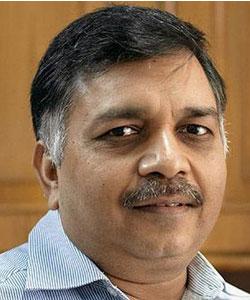A Vision for a Healthy India
A Q&A with Pawan Agarwal, CEO of the Food Safety and Standards Authority of India (FSSAI).

What are some of the challenges facing India from a food safety perspective?
India is a large country with a population of 1.3 billion. About 200 million suffer people from various forms of malnutrition and under-nutrition, and about 150 million suffer from foodborne diseases and infections every year. The Indian consumer is buying his or her food from a variety of food businesses, and a very large number of food businesses are in the unorganized sector. India is a land of huge diversity, including diversity of food. Therefore, the challenges for food authorities also become much bigger and more complex.
How does FSSAI tackle these issues?
Our responsibility at FSSAI is to see that consumers can have trust in the food that they get in the marketplace. We have to put in place a system of standards and compliance measures that are integrated by food businesses in all categories. The enormity of task before us cannot be understated. Even though we may have gotten several things right, even though we may have total alignment of the stakeholders - food businesses, consumer organizations, scientists and other government authorities - ensuring safe and nutritious food for all 1.3 billion people in itself is a huge challenge. Therefore, communication is very important and we also have to find innovative ways to engage with all of the stakeholders involved.
How is FSSAI addressing India’s nutrition challenges?
Among the various forms of undernutrition, two are key. One is protein deficiency in the diet, because a large section of the Indian population is vegetarian. The second is about micronutrient and vitamin deficiency. A very large number of Indians, particularly children and lactating mothers, suffer from deficiency in iron, folic acid, vitamin A and vitamin D. This fortunately is a challenge that can be addressed easily by fortifying dietary staples such as cooking oil. FSSAI is playing a key role in the fortification drive in the country, and Cargill has also been leading the effort by fortifying its cooking oils, which are widely used in Indian households.
What else can Cargill do to help FSSAI achieve its mission?
Cargill has been proactively engaged in efforts to provide safe and nutritious food to our citizens. They have created a flywheel of support for safe food in the country over the last two to three years and we do hope that moving forward, Cargill will help FSSAI and other government agencies in scaling up this initiative as we try to reach out to all of our citizens.
What is your vision for the future of FSSAI?
My vision for FSSAI is to provide safe and nutritious food to all citizens to ensure that the incidence of foodborne diseases and infections, incidences of undernutrition and malnutrition is over a period of time reduced to zero. I would like to see our role as a regulator become less important as we build trust with food businesses so that we can become primarily a facilitator, educator, friend and guide to ensure that there is fair and objective cooperation between food businesses across the value chain.
What does success look like?
We have a disease-free population. We have healthy and happy citizens. That is my vision for India.

